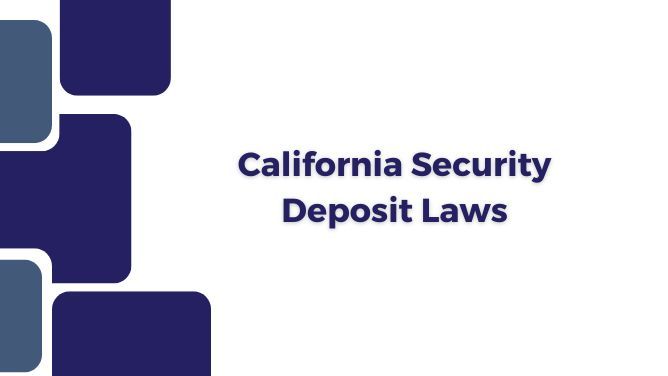Renting Out Your Home in San Francisco: Everything You Should Consider
Federal legislation doesn’t always make it onto a property owner’s rader, but when the fine print affects how you write off mortgage insurance, invest in new buildings, or preserve tax savings, it’s worth a closer look.

The newly signed One Big Beautiful Bill Act (H.R.1) brings a major update to the U.S tax code and housing-related policy. While it doesn’t introduce big new homebuyer programs, it offers something property owners and managers can truly appreciate: long term clarity.
From deductions to development credits, here’s what landlords, investors and property management professionals should know about how this bill affects real estate.
Mortgage Insurance Deductions Are Now Permanent
Borrowers can now properly deduct mortgage insurance premiums including FHA MIP, VA funding fees, and USDA guarantee fees - as long as they fall within income limits. This is especially helpful for smaller investors or newer buyers using low-down-payment options. Over time, this helps reduce the cost of borrowing and improves ROI.
Beneficial For:
- Small landlords using FHA or VA financing
- Investors putting down less than 20%
- First-time property owners
The 750K Mortgage Interest Deduction Cap Is Locked In
The mortgage interest deduction cap remains at $750,000 of acquisition debt and is now permanent. While the cap isn’t rising, the consistency makes financial planning easier for those operating in high-cost markets where loans often exceed traditional thresholds.
Beneficial For:
- Investors in high-cost metros
- Owners of larger single-family or small multifamily properties
- Those planning a refinance or upgrade
More Low-Income Housing Tax Credits Coming to Market
The law increases allocations of the 9% Low-Income Housing Tax Credit (LIHTC) by 12.5% and cuts the bond financing requirement for 4% LIHTC projects in half. More affordable housing projects are likely to break ground, potentially changing local rental dynamics and increasing competition in some markets.
Beneficial for:
- Developers focused on affordable housing
- Property managers in workforce housing
- Owners of Class B/C units near new builds
No New Federal Down Payment or Homebuyer Assistance
Despite earlier proposals, no new first-time buyer credits or down payment grants made it into the bill. In fact, several HUD programs were rescinded. This means federal support for new buyers remains limited, keeping rental demand high.
Beneficial for:
- Owners of starter or mid-range rentals
- Property managers fielding more tenant interest
- Landlords in markets with high home prices
SALT Deduction Cap Temporarily Increased
Between 2025–2029, the cap on state and local tax (SALT) deductions will rise from $10,000 to $40,000 per household, phasing down for those earning over $500,000. This provides substantial tax relief for homeowners and investors in high-tax states.
Beneficial for:
- Investors in California, New York, New Jersey, and similar markets
- High-income property owners
- Owners of second homes or investment properties
Real Estate Investor Provisions That Matter
Qualified Business Income (QBI) Deduction Made Permanent
The 20% deduction on qualified business income is now permanent. Rental property typically qualifies, meaning investors can deduct 20% of net rental income from their taxable earnings.
Beneficial for:
- LLC and S-corp real estate operators
- Small and mid-sized landlords
- Investors focused on long-term cash flow
Mortgage Interest Deductions for Real Property Stay
Mortgage interest for real estate businesses remains fully deductible, a major advantage in an environment of elevated interest rates.
Beneficial for:
- Investors using commercial or DSCR loans
- Operators with large mortgage balances
- Anyone leveraging properties for growth
1031 Exchanges Are Still in Play
No changes were made to Section 1031, allowing investors to defer capital gains when selling and reinvesting in new properties. This remains a foundational strategy for growing portfolios without taking a tax hit.
Beneficial for:
- Investors scaling portfolios
- Landlords exchanging one property for another
- Estate planners managing multi-property assets
Gain Rollover Options Preserved
Gains from property sales can still be rolled into Qualified Opportunity Zones or other tax-advantaged structures, preserving flexibility in reinvestment and tax strategy.
Beneficial for:
- Investors exploring emerging markets
- Those selling high-gain assets
- Builders targeting designated zones
$5 Trillion Federal Debt Ceiling Increase
While not specific to real estate, the raised debt ceiling helps preserve confidence in capital markets, a positive backdrop for borrowing and investor financing.
Beneficial for:
- Anyone relying on lending for acquisitions
- Developers seeking construction loans
- CRE and DSCR borrowers needing liquidity

Final Takeaways for Property Managers and Owners
The One Big Beautiful Bill Act may not reinvent real estate, but it locks in vital tax advantages and reduces uncertainty. This gives landlords, investors, and operators a more stable landscape to plan in.
If you are actively managing properties or supporting clients with their real estate goals, now is the time to revisit your financial strategy. Knowing which deductions are here to stay and which opportunities are opening up can give you the upper hand in a competitive market.
Next Steps
Understanding tax and housing changes is one thing. Putting them into practice for your property is another. At BanCal Properties, we help owners and investors stay informed, adapt with confidence, and make the most of every opportunity in the market.
Want to learn more? Contact us today to explore how we can help you protect and grow your investment.








